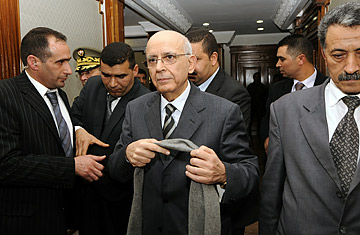
Tunisian Prime Minister Mohammed Ghannouchi (C) stands outside Tunisian President Fouad Mbazaa's office, surrounded by staff members as he prepares to leave following a press conference on February 27, 2011 at Carthage Palace near Tunis.
Barely six weeks since Tunisia became the first successful popular uprising in the Arab world, the Prime Minister of that small country quit on Sunday, making it clear that the revolt in the place where the uprisings all began is far from over.
Prime Minister Mohammed Ghannouchi announced on television late Sunday afternoon that he was resigning, one day after three people were killed in clashes with security forces during protests demanding that the government step down. Thousands of protesters had stormed into Tunis's main boulevard, Avenue Habib Bourghiba, in a déjà vu scene from the extraordinary Jasmine Revolution in January, which drove President Zine El Abidine Ben Ali into exile in Saudi Arabia on Jan. 14 after more than two decades in power. Tunisia's successful revolution — unprecedented in the Arab world — inspired the Egyptian revolution immediately after, as well as massive streets protests in Yemen, Algeria, Bahrain, Iraq and now Libya.
But while the world's attention drifted away, Tunisians themselves remain deeply worried that their battle for democracy is still precarious. Ghannouchi, who was a former minister in Ben Ali's government, and was briefly president during the hours after Ben Ali fled, had promised elections by July. Yet the government has been divided over whether those elections would be for a new government, or for a constituent assembly to draft an entirely new constitution for Tunisia's first true democracy. "People keep saying, 'there is no road map,'" says Eric Goldstein, deputy director for North Africa and the Middle East for Human Rights Watch, who is currently in Tunis. "People are anxious that the country will slide back to a dictatorship."
The deadly riots on Saturday suggest that there are still numerous armed security forces operating. Still, it is not certain who provoked the violence — or whether the demonstration which turned violent had widespread support. An interior ministry official, however, told Reuters on Sunday that the demonstration was provoked by Ben Ali supporters, some of whom are still active in Tunis. "Those who were arrested have admitted they were pushed by former Ben Ali officials," said the official, who was not named by Reuters.
Khais El-Ghoul, 25, one of the Tunis activists who helped organize the Facebook campaign which drew hundreds of thousands of protesters into the street to overthrew Ben Ali, said many like him were prepared to accept Ghannouchi as an interim Prime Minister, so long as elections went off as planned in July. "Many believed he was an honest man, but they didn't want him in the new government because he worked with Ben Ali," El-Ghoul said by phone from Tunis on Sunday.
Post-revolutionary Tunis provides sobering lessons for the movement that forced out Egypt's president Hosni Mubarak on Feb. 11 — and for those now fighting to end Muammar Gaddafi's 41-year rule in Libya. Goldstein says Tunisians have been able to rely on the Army throughout the past six weeks to keep peace — something which might not be the case in Libya. "The Tunisian army continues to have a good reputation, and is counted on to be the honest broker," he says. With that one structured force in place, many advances have been made — including an amnesty signed last week allowing all political exiles to return without fear of arrest.
On the other hand, Tunisia's new-found freedom shows how crucial it is to transform the security forces quickly, in order to avoid fresh violence once dictators have gone. "The security forces need to be reformed immediately, because these killings can destabilize things radically," Goldstein says. "It leads people to say, 'you see, nothing has changed here.'"
